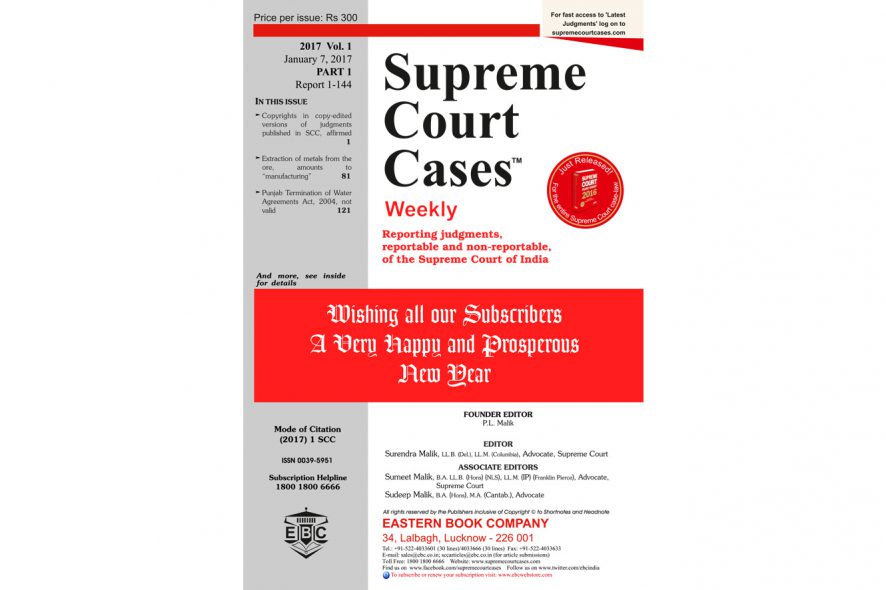Armed Forces — Pension — Entitlement to: Mere fact that appellant had crossed threshold of four red entries could not be ground for his discharge without considering other relevant circumstances including (i) nature of violation which led to award of red ink entries; (ii) exposure to duty in hard stations; and (iii) long years of service just short of completing qualifying period for pension. Hence, discharge from service shortly before completion of qualifying service for grant of pension under R. 13(3) Table (III)(v), Army Rules, 1954 without considering relevant and germane circumstances while discharging appellant, not proper. [Vijay Shankar Mishra v. Union of India, (2017) 1 SCC 795]
Armed Forces — Re-engagement — Naval Services: As appellant sailor’s prayer for grant of re-engagement for five years after completion of initial engagement for ten years, unjustifiably rejected, the appellant is entitled for addition of 5 yrs of notional service to the period of 10 yrs which he has already served for the purpose of being eligible for pensionary benefits. He will not be entitled for salary and allowances for the said period of 5 yrs. Appellant shall be entitled to claim all service benefits to which he is entitled by being treated as having completed 15 yrs of service. [Ved Prakash v. Union of India, (2017) 1 SCC 783]
Constitution of India — Arts. 15, 51-A(e) and 32 — Racial discrimination faced by people of North-Eastern States of India: Directions issued to curb racial discrimination faced by people of North-Eastern States of India. [Karma Dorjee v. Union of India, (2017) 1 SCC 799]
Penal Code, 1860 — Ss. 364-A, 395, 412, 471 and 120-B — Money extracted to release kidnapped person, and victim intimidated/threatened from approaching police: Conviction for kidnapping for ransom and conspiracy for the same, upheld as the kidnapping for ransom and conspiracy for the same proved by: (a) testimonies of victim and his father; (b) recoveries made on basis of disclosures made by accused persons; and (c) evidence of police witnesses, fingerprint expert, lenders from whom victim borrowed ransom money and other witnesses. [Harpal Singh v. State of Punjab, (2017) 1 SCC 734]
Preventive Detention — Detention order — Subjective satisfaction of detaining authority — Judicial review/Validity of subjective satisfaction: Allegations of procedural defects vitiating detention order, not tenable, hence, writ petition challenging detention order, dismissed. [E. Subbulakshmi v. State of T.N., (2017) 1 SCC 757]
Service Law — Departmental Enquiry — Enquiry procedure — Natural Justice — Non-compliance: Decision to impose punishment before furnishing enquiry report to delinquent is not sustainable. Relief of automatic reinstatement cannot be granted in such circumstances, however, proper conclusion of disciplinary proceedings, directed. [H.P. SEB v. Mahesh Dahiya, (2017) 1 SCC 768]
Transfer of Property Act, 1882 — S. 58(c) proviso — Requirement in said proviso that reconveyance condition be contained in the sale deed, for transaction to qualify as mortgage by conditional sale: Respondent 1-plaintiff executed a sale deed dt. 14-6-1972 as to suit property in favour of appellant-defendants for a sum of Rs 3000, subsequently, on same date i.e. 14-6-1972, plaintiff entered into an agreement with defendants that if he paid back Rs 5000 to defendants by 14-6-1973, then the sale deed would be cancelled and plaintiff would get back the property sold to defendants. Though in sale deed concerned no condition as stipulated in S. 58(c) of TP Act was incorporated, held, reading together the sale deed and the subsequent agreement executed on same day, courts below rightly held that the sale deed was executed only as a security for repayment of loan and plaintiff never intended to sell the property to defendants. More so, where sale consideration mentioned in sale deed was inadequate in comparison to market value of property at relevant time. Consequently, since plaintiff paid back the loan amount i.e. Rs 6700 (as was evident from subsequent agreement dt. 5-6-1974), courts below rightly opined that sale deed was not binding on plaintiff. Plaintiff entitled to declaration of sale deed as null and void. [Ramvilas v. Karim Khan, (2017) 1 SCC 789]






